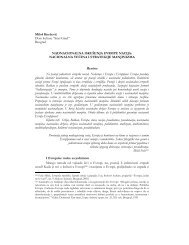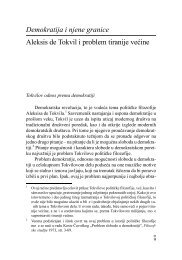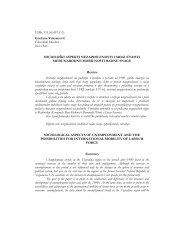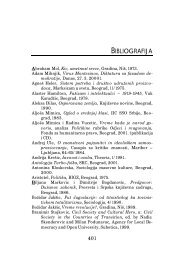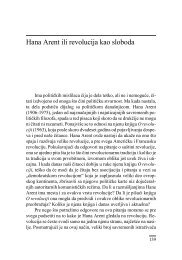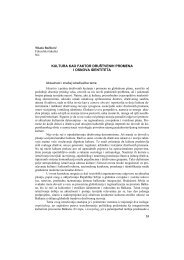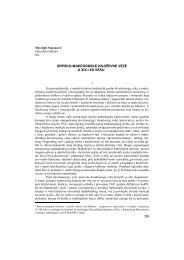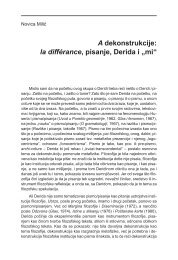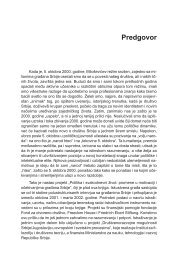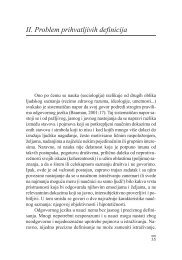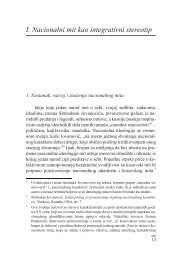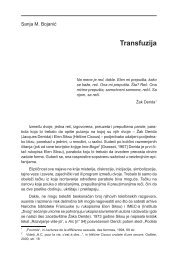Rezime - Komunikacija
Rezime - Komunikacija
Rezime - Komunikacija
Create successful ePaper yourself
Turn your PDF publications into a flip-book with our unique Google optimized e-Paper software.
MENADŽMENT I PRIVREDNA ELITA U ZEMLJAMA TRANZICIJE<br />
MANAGEMENT AND ECONOMIC ELITE IN THE TRANSITION<br />
COUNTRIES<br />
Summary<br />
Transition is defined in different ways. Yet, an agreement seems almost to exist that it<br />
represents the process of setting up private property, market economy and multi-party system in the<br />
countries that used to be regarded as socialist. In this process of transition an important role is played<br />
by management as well no matter whether it is public (state) or private (economic) management.<br />
The paper points to the main characteristics and changes in the modern management of the<br />
developed countries with private property and market economy whose organization model is the one<br />
that the transition countries are tending to achieve. In such an approach, the development of<br />
management under the impact of the changes within organizations and institutions and their<br />
autonomous development are pointed out and thus, in this context, both the public and the private<br />
management obtain specific traits in the transition countries.<br />
The peculiarity of management in the transition countries springs from the specific character<br />
of the economic subjects that develop and do business in the newly-established property relations (in<br />
which most often management is not separated from ownership in the sense that property-owners<br />
appear as managers as well) and from the state organization that has just started to take on the<br />
characteristics of the legal state. On top of all, the employed people find it difficult to accommodate to<br />
the new social conditions of the working activities.<br />
In the transition countries management should be developed along with all its specific traits<br />
since this is a prerequisite for their economies to be efficient, profitable and competitive on the regional<br />
(most of all, Balkan and European) and world markets. For management to develop it is necessary to<br />
organize modern education of managers and to discard the unacceptable attitude that it is sufficient for<br />
the manager profession that an individual has abilities for it, even more so if these abilities have<br />
manifested themselves only in the property acquisition in the transition process (and often in a legally<br />
and morally irregular way). Neither is it less difficult to create an economic elite than it is to establish<br />
private property and market economy. It is even more difficult to develop public management and<br />
educate staff for this management. The knowledge for management cannot be assigned in the same way<br />
as the manager positions are assigned. This is the knowledge that has to be mastered and constantly<br />
built upon and developed in accordance with the social development dynamics.<br />
Key Words: Transition, Management, Economic Elite, Education for Management,<br />
Private Property, Market<br />
1. Početak dvadesetog veka bio je u znaku ostvarivanja socijalističkih i<br />
komunističkih ideja (oktobarska revolucija 1917. godine u Rusiji) koje su u<br />
prethodnom (devetnaestom) veku bile, manje ili više, teorijski oblikovane i ideološki<br />
osmišljene. Tokom sedamdeset godina su te ideje društveno oblikovane razvojem<br />
socijalističkog društveno-ekonomskog sistema, u izvesnom broju zemalja centralne i<br />
istočne Evrope i Azije. Čak se sredinom tog (dvadesetog) veka smatralo, po nekim<br />
202



